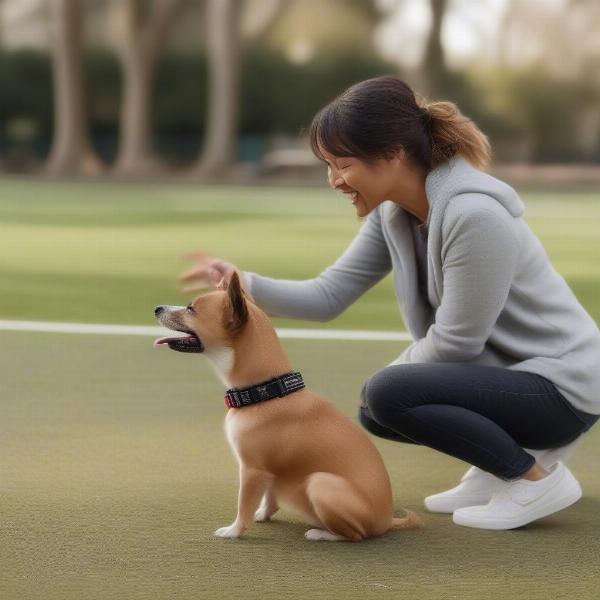Choosing the right training collar for your small dog can feel overwhelming. With so many options available, it’s important to find one that’s both effective and safe for your pint-sized companion. This article will guide you through the best training collars for small dogs, considering factors like size, breed, and training goals. We’ll cover everything from traditional collars to more advanced options, ensuring you make the best choice for your furry friend.
Types of Training Collars for Small Dogs
There’s a wide variety of training collars designed specifically for small dogs. Let’s explore some of the most popular and effective options:
Flat Collars
Flat collars are the most basic type and are suitable for everyday use. They are typically made of nylon or leather and come in various sizes and colors. While they aren’t specifically designed for training, they are essential for attaching ID tags and leashes.
Martingale Collars
Martingale collars are a great choice for small dogs who tend to slip out of their collars. They tighten slightly when pulled, preventing escape without choking. This makes them a humane and effective option for training.
Harnesses
Harnesses are a comfortable and safe alternative to collars, especially for small breeds prone to tracheal collapse. They distribute pressure evenly across the chest and back, reducing strain on the neck. Harnesses are available in front-clip and back-clip styles, each offering different training benefits.
Head Collars
Head collars, also known as gentle leaders, work by gently redirecting your dog’s head. They provide more control and can be particularly helpful for dogs who pull on the leash. While effective, they require proper introduction and training to ensure your dog accepts them comfortably.
Choosing the Right Collar: Key Considerations
Selecting the best training collar for your small dog requires careful consideration of several factors.
Size and Breed
Always choose a collar that fits your dog’s neck size comfortably. Measure your dog’s neck and refer to the manufacturer’s size chart. Consider your dog’s breed and potential for growth, especially if you have a puppy.
Training Goals
What are you hoping to achieve with training? Different collars are better suited for different goals. A martingale collar might be ideal for leash training, while a harness might be better for general obedience. dog leashes for small dogs can also be a factor in your decision.
Comfort and Safety
Prioritize your dog’s comfort and safety. Ensure the collar is made of high-quality materials and doesn’t irritate their skin. Avoid collars that are too tight or restrict their breathing.
Training Tips for Small Dogs
Regardless of the collar you choose, consistency and positive reinforcement are crucial for successful training. Keep training sessions short and engaging, and always reward your dog for good behavior. Remember to consult with a professional dog trainer if you’re facing challenges. A best dog training collar for small dogs will only work if you utilize good training techniques.
What is the best training collar for a puppy?
A lightweight, adjustable flat collar or a properly fitted harness is often recommended for puppies.
Can I use a shock collar on a small dog?
Shock collars are generally not recommended for small dogs due to their delicate nature. Positive reinforcement methods are usually more effective and humane.
How do I measure my small dog for a collar?
Use a flexible measuring tape to measure the circumference of your dog’s neck, adding two fingers’ width for comfort.
Expert Insight:
Dr. Emily Carter, DVM: “Choosing the correct training collar is paramount for a small dog’s well-being. Consider their individual needs and always prioritize comfort and safety.”
Sarah Miller, Certified Dog Trainer: “Positive reinforcement training methods work wonders with small breeds. Combine consistent training with the right collar for optimal results.”
 Small dog training with collar
Small dog training with collar
Conclusion
Finding the best training collar for small dogs involves understanding your dog’s specific needs and your training objectives. Whether you opt for a flat collar, martingale collar, harness, or head collar, remember that proper fit, consistent training, and positive reinforcement are essential for success. By carefully considering the options and investing time in training, you can build a strong bond with your small companion and ensure they thrive. A dog collar bulldog may be more robust than what a smaller dog would need. Similarly, plaid dog leashes and collars can be a stylish choice but prioritize function over fashion when training.
FAQ
- What is the most important factor to consider when choosing a training collar for a small dog? Size and comfort are crucial. The collar should fit snugly but not be too tight.
- Are harnesses better than collars for small dogs? Harnesses can be a good option, especially for breeds prone to tracheal issues, as they distribute pressure more evenly.
- How do I introduce a new training collar to my small dog? Introduce the collar gradually and associate it with positive experiences like treats and praise.
- What if my small dog keeps slipping out of its collar? Consider a martingale collar or harness to prevent escapes.
- Can I use a training collar on a puppy? Yes, but choose a lightweight and appropriately sized collar for a puppy.
- How often should I check the fit of my dog’s collar? Regularly check the fit, especially if your dog is still growing.
- Where can I find additional information about lost pets in Chicago? If you’re concerned about lost pets in Chicago, visit our page on chicago missing dogs for helpful resources.
ILM Dog is a leading online resource dedicated to providing expert advice on all aspects of dog care and wellbeing. From breed selection to health, training, and nutrition, we offer valuable information to help dog owners provide the best possible care for their furry companions. We specialize in helping you understand your dog’s unique needs and providing tailored solutions. Contact us at [email protected] or +44 20-3965-8624. ILM Dog is here to support you and your dog every step of the way.